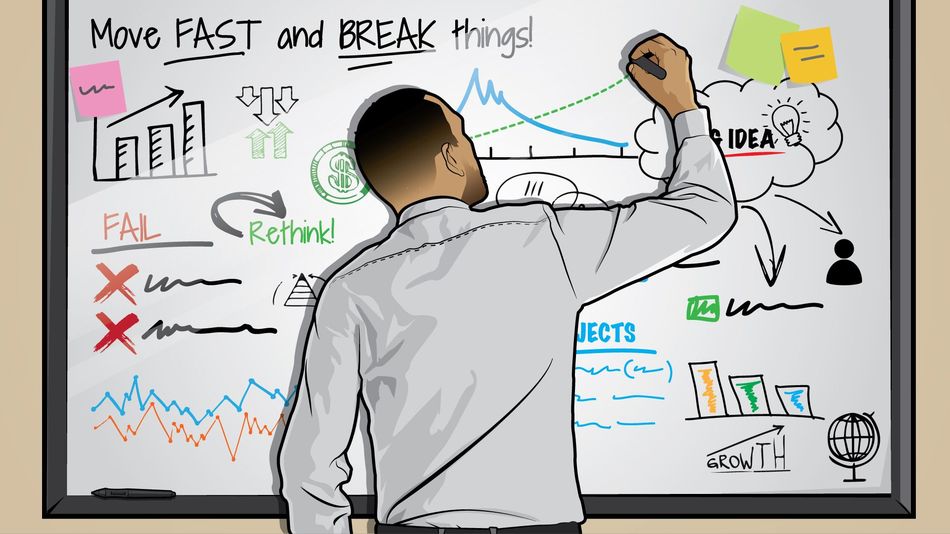The No. 1 Rule in Entrepreneurship: ‘Move Fast and Break Things’
In recent years, innovation has occurred more often and at a faster pace than ever before.
On a daily basis, we gain access to brand new inventions, technologies and abilities that change the way we think, the way we live and the way we do business.
This rapid advancement has created a simultaneously rapid escalation in expectations. We’re increasingly accustomed to new and amazing items and capabilities being available to us every day.
What does this mean to the un-corporate entrepreneurs who are responsible for the lion’s share of these developments?
It means they have to concept and execute more quickly and efficiently than the more corporate leaders of yore. Which means that sometimes they’re going to have to experience a few failures on their way to success.
In short, they have to move fast and break things. It’s an approach that HP BusinessNow’s Office of the Future series sees as key to succeeding in an increasingly entrepreneurial world.
The un-corporate world: a culture that embraces failure
In the un-corporate world, there’s a prevailing notion that mistakes can actually be a good thing — not something to be chastised or even consciously avoided, especially when they come in the name of innovation. Many entrepreneurs actively encourage their employees to push the envelope to the point that failure is a definite possibility, if not a likely outcome.
The way of thinking is that you should follow your instincts when you’re pursuing an invention or venture, and that mistakes and missteps along the way are fine, as long as you learn from them. It may seem risky at first — and “risk” is a word that some corporations and organizations tend to avoid — but there’s an inherent risk in the first place when you start your own business or join a start-up that could either sink or swim.
In fact, some entrepreneurs believe they actually learn more when they fall short than from when they succeed.
One notable example is British inventor Sir James Dyson. His company Dyson made its name through its innovative and creative approach to designing and manufacturing domestic appliances — from vacuum cleaners to hand dryers and more.
“Failure is interesting — it’s part of making progress,” Dyson told Entrepreneur in an interview about how he uses failure to drive success. “You never learn from success, but you do learn from failure.”
And Dyson would know. According to Entrepreneur, Dyson’s Dual Cyclone vacuum cleaner was 15 years and 5,126 failed versions in the making before it finally launched in 1993.
But the finished product ultimately helped forge a multi-billion dollar company.
“We have to embrace failure and almost get a kick out of it,” Dyson said. “Not in a perverse way, but in a problem-solving way. Life is a mountain of solvable problems and I enjoy that.”
The power of prototyping in the beta age
Dyson was a bit ahead of the curve in developing his ethos to embrace failure and prototype over and over until he perfects an invention, but among the new wave of entrepreneurs, prototyping has swiftly become commonplace — because if you build something in beta, you can produce it quickly, then see if it works and how a select group of people feel about it. And if it doesn’t work or is flawed, you haven’t drained all of your money, resources and bandwidth into a product or initiative that won’t ultimately be successful.
If it does work, you can incorporate feedback from your testers (if need be) and then prepare it for a larger launch.
Prototyping reigns especially supreme at Impact Hubs, a global network of co-working spaces and incubators that currently has 73 locations in 49 countries. Impact Hubs are open, shared spaces that enable entrepreneurs and small business owners to assemble small, hyper-localized teams for in-person problem solving and collaboration. The working spaces are very different from a typical corporate office environment, and so are the processes, methods and beliefs of those who use them.
At Impact Hubs, pretty much everything is prototyped in some way — from the workspaces themselves, to the big ideas, products, services and technologies that come out of them. The entire network is, in some ways, a series of constantly evolving beta tests.
“We learn by doing,” said Impact Hub Director Richard Evans. “We prototype things. We do them small, and if they work, great. We scale them. If they don’t, we figure out why they don’t while they’re still small, and try again.”
Evans added that the network celebrates failure, and even has a popular fixture where Impact Hub’s users share their failures and everyone has a “good laugh” about where things went wrong, and what was learned.
“Move fast and break things” in the wider world of business
As small businesses and entrepreneurs continue to build their success through the “move fast and break things” mantra, you may see the wider world of business adopting the same approach.
Think about it: we are continuously adapting to and embracing new inventions and innovations, and the opportunities and efficiencies they make possible. And businesses must also adapt to the ways these innovations are occurring.
Source: mashable.com




